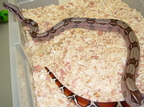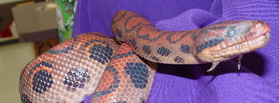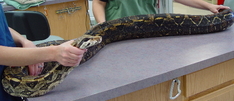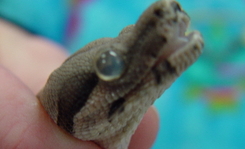General Care of Boa Constrictors (Boa constrictor spp.)
By Robert Nathan DVM
Pictures by Susan Horton, DVM
Barberton Veterinary Clinic, 4873 Richland Ave. Norton , OH 44203 USA Provided by ARAV.org
Pictures by Susan Horton, DVM
Barberton Veterinary Clinic, 4873 Richland Ave. Norton , OH 44203 USA Provided by ARAV.org

Enclosure
Boas should be housed individually, except during breeding attempts. Enclosures for juvenile boas should be at least 61 cm (24 in) long and 38 to 61 cm (15 to 24 in) high. Adult boas should be housed in enclosures at least 1.8 m (6 ft) long, 61 cm (24 in) wide, and at least 61 cm (24 in) high. Larger cages provide better opportunities for establishing a proper thermal gradient.
Boas should be housed individually, except during breeding attempts. Enclosures for juvenile boas should be at least 61 cm (24 in) long and 38 to 61 cm (15 to 24 in) high. Adult boas should be housed in enclosures at least 1.8 m (6 ft) long, 61 cm (24 in) wide, and at least 61 cm (24 in) high. Larger cages provide better opportunities for establishing a proper thermal gradient.

Temperature and Humidity
Providing the proper thermal gradient is critical to the well being of the snake. The preferred optimal temperature zone during the day is between 27-29 C (80-85F), with a basking spot up to 35C (95F). Night time lows can be between 21-27C (70-80F). Thermostatically controlled fiberglass heat mats are an excellent way to provide the proper thermal environment. The mats are mounted ventrally and should be no larger than 25 to 30% of the surface area of the cage. Flexwatt and plumbing heat tape may also be used, however both require some wiring and should be assembled with a rheostat (thermostat).
Humidity is also important to enable normal ecdysis (shedding) and respiratory function. Relative humidity should be at least 50 to 70%. Hide boxes that contain moistened sphagnum moss are an excellent way to provide an area of locally increased humidity. Pictured above is a Brazilian Rainbow boa having difficulty shedding.
Providing the proper thermal gradient is critical to the well being of the snake. The preferred optimal temperature zone during the day is between 27-29 C (80-85F), with a basking spot up to 35C (95F). Night time lows can be between 21-27C (70-80F). Thermostatically controlled fiberglass heat mats are an excellent way to provide the proper thermal environment. The mats are mounted ventrally and should be no larger than 25 to 30% of the surface area of the cage. Flexwatt and plumbing heat tape may also be used, however both require some wiring and should be assembled with a rheostat (thermostat).
Humidity is also important to enable normal ecdysis (shedding) and respiratory function. Relative humidity should be at least 50 to 70%. Hide boxes that contain moistened sphagnum moss are an excellent way to provide an area of locally increased humidity. Pictured above is a Brazilian Rainbow boa having difficulty shedding.
Substrate
Newspaper or butcher paper is the preferred substrate since it is inexpensive and easy to change when it becomes soiled. Each also has the added benefit of allowing direct visualization of the feces and urates. Artificial turf, mulches, and various wood shavings may also be used, but lack some of the beneficial qualities of newspaper. Mulches and wood shavings may inadvertently be ingested while feeding.
Newspaper or butcher paper is the preferred substrate since it is inexpensive and easy to change when it becomes soiled. Each also has the added benefit of allowing direct visualization of the feces and urates. Artificial turf, mulches, and various wood shavings may also be used, but lack some of the beneficial qualities of newspaper. Mulches and wood shavings may inadvertently be ingested while feeding.
Cleaning
Dilute bleach water ( 1:30 ) is a useful disinfectant for cages and artificial turfs. All organic matter needs to be washed away prior to using the dilute bleach. The bleach solution should be left on for ten minutes before washing off.
Dilute bleach water ( 1:30 ) is a useful disinfectant for cages and artificial turfs. All organic matter needs to be washed away prior to using the dilute bleach. The bleach solution should be left on for ten minutes before washing off.
 Dumeril's Boa
Dumeril's Boa
Feeding
Generally, boas should be fed prey items no larger than their girth at mid-body. Juvenile boas should be fed the appropriate sized rodent (s) weekly. As boas reach adulthood, it is acceptable to decrease the feeding interval to every ten to fourteen days. Adult boas can be maintained on either adult rats or appropriately sized rabbits. Either frozen and thawed (warmed to body temperature) of freshly killed prey is recommended. The prey should be humanely euthanized using acceptable methods. Frozen prey should be used within six months of freezing.
Generally, boas should be fed prey items no larger than their girth at mid-body. Juvenile boas should be fed the appropriate sized rodent (s) weekly. As boas reach adulthood, it is acceptable to decrease the feeding interval to every ten to fourteen days. Adult boas can be maintained on either adult rats or appropriately sized rabbits. Either frozen and thawed (warmed to body temperature) of freshly killed prey is recommended. The prey should be humanely euthanized using acceptable methods. Frozen prey should be used within six months of freezing.
 Adult female Columbian Red Tailed Boa
Adult female Columbian Red Tailed Boa
Reproduction
Sexing boas can easily be accomplished by probing. Juvenile boas may be sexed also by manual eversion “popping” of the hemipenis. Either technique should be performed by an experienced person or reptile veterinarian, since poor technique may result in injury. Generally, females probe a distance of two to four sub caudal scales and male boas probe eight or more. Male boids have larger cloacal spurs and thicker tails than females. Sexual maturity occurs between three and five years of age, if appropriately fed and maintained.
Sexing boas can easily be accomplished by probing. Juvenile boas may be sexed also by manual eversion “popping” of the hemipenis. Either technique should be performed by an experienced person or reptile veterinarian, since poor technique may result in injury. Generally, females probe a distance of two to four sub caudal scales and male boas probe eight or more. Male boids have larger cloacal spurs and thicker tails than females. Sexual maturity occurs between three and five years of age, if appropriately fed and maintained.
 Hatchling Brazilian Rainbow Boa
Hatchling Brazilian Rainbow Boa
Boa breeders begin cycling in either November of December. Boas are not fed for two weeks prior to cooling. The temperature is gradually decreased to 21- 24C (70-75F). Some breeders keep the snakes at their preferred daytime high temperature, but drop the nighttime low to 21-24C (70-75F). It is possible to utilize a combination of these two techniques. Monitor the snakes carefully for any evidence of respiratory disease. Respiratory infection is most likely if the snakes are not provided a basking spot in their preferred temperature range for at least part of the day and, because of this, the first technique is not recommended. Depending on the breeder, males are introduced to females either at the beginning of, during, or after cycling. Active courtship preceded copulation. Gravid females require access to adequate basking temperatures for proper fetal development. Litter sizes range from 6 to 64, with 25 being typical.

Medical Problems
Good husbandry is the best way to prevent many problems. Boas should be quarantined for at least three to six months before being added to an established collection.
Respiratory tract disease is very common in captive boas. Difficulty breathing, discharges from the mouth, and wheezing are common signs associated with respiratory tract disease.
Vomiting/regurgitating is a common sign of many problems. Inadequate temperature, excessive feeding, and handling after feeding are common causes. There are many medical causes for vomiting/regurgitating and an able reptile veterinarian should be sought.
Good husbandry is the best way to prevent many problems. Boas should be quarantined for at least three to six months before being added to an established collection.
Respiratory tract disease is very common in captive boas. Difficulty breathing, discharges from the mouth, and wheezing are common signs associated with respiratory tract disease.
Vomiting/regurgitating is a common sign of many problems. Inadequate temperature, excessive feeding, and handling after feeding are common causes. There are many medical causes for vomiting/regurgitating and an able reptile veterinarian should be sought.
 Rosy Boa
Rosy Boa
Snake mites are very common external parasites. The mites may cause significant disease and distress to the infested snake. They also spread diseases such as IBD.
Inclusion body disease (IBD) is one of the most significant diseases affecting boas today. It is thought to be caused by a retrovirus. Snakes affected by IBD may have neurologic signs, regurgitation, pneumonia, various cancers, and other disorders. Currently no therapy is available for affected snakes and euthanasia is recommended to prevent transmission to other snakes.
Other common signs of problems include loss of appetite, loose stools, difficulty shedding, and lumps/bumps. Pictured above is a very complex eye problem involving fluid accumulation under the eye scale. A competent reptile veterinarian should be sought out to diagnose and treat any of the disorders that may affect your boa.
Speak with your reptile veterinarian about Salmonella and what measures are recommended to limit the risk of transmission to people.
If you have any questions, please feel free to call us at 847-329-8709.
Inclusion body disease (IBD) is one of the most significant diseases affecting boas today. It is thought to be caused by a retrovirus. Snakes affected by IBD may have neurologic signs, regurgitation, pneumonia, various cancers, and other disorders. Currently no therapy is available for affected snakes and euthanasia is recommended to prevent transmission to other snakes.
Other common signs of problems include loss of appetite, loose stools, difficulty shedding, and lumps/bumps. Pictured above is a very complex eye problem involving fluid accumulation under the eye scale. A competent reptile veterinarian should be sought out to diagnose and treat any of the disorders that may affect your boa.
Speak with your reptile veterinarian about Salmonella and what measures are recommended to limit the risk of transmission to people.
If you have any questions, please feel free to call us at 847-329-8709.
